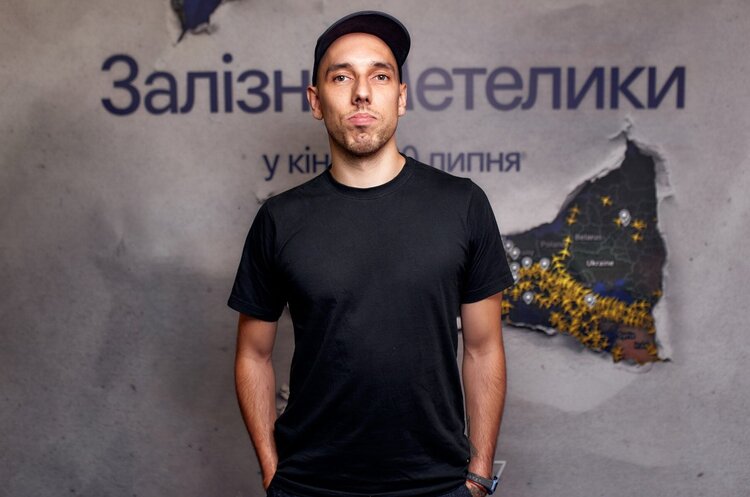The director of the film about the MH-17 downing: "When we watch films, we live very different lives – it's an illusion of a certain life experience"
Roman Liuby – on how films can serve as therapy for the military, as well as a ‘mirror’ for Ukrainian society, and why the industry should not focus only on the topic of war

Roman Liuby – Ukrainian director, known for his documentary films about war crimes, including the feature-length War Note and the short films Kombat Zadovoleny (Battalion Commander Satisfied) and Microrayon Skhidny (Eastern Microdistrict).
Roman's documentary film Iron Butterflies, which was released in Ukrainian cinemas on July 20, tells the story of the circumstances of the downing of the civilian MH-17 flight by russian forces with 298 people on board. The film was first shown in January 2023 at the main American independent film festival, Sundance, and had its European premiere at one of the world's largest film events – the Berlinale.
In an interview with Mind, director Roman Liuby told about the peculiarities of making films about war crimes, the role of cinema during wartime, which has also turned into the realm of art, and what the Ukrainian film industry lacks today.
– What obstacles did you encounter during the filming of Iron Butterflies?
– There were numerous obstacles, depending on what you consider them – the ongoing COVID situation and the full-scale invasion. When we initially started this project, we expected it to be completely different from what it turned out to be: a continuation of the technique I used for the short films Battalion Commander Satisfied and Eastern Microdistrict, both of which are available on the Babylon’13 YouTube channel. Those films were made solely from materials of criminal investigations, and we thought this would be a similar film, only full-length.
The first obstacle was that no one was willing to share the materials of the investigation because it was international, just like the court. So, we began working with Open Source, where we faced no issues. There are organisations and individuals who delved into the investigation and reconstructed the events much deeper than we did – we gathered insights from the work done by organisations like Bellingcat. We didn't cooperate with them on an official level, but we familiarised ourselves with their work as readers. We acknowledged them in the film credits as well.
– With relatives and friends of the deceased, it's been difficult to communicate and get in touch. However, perhaps they reacted somehow to the film about their loved ones.
– We met Robbie, the film's protagonist, at one of the events organised by the Joint Investigation Team. We found him among the relatives of the deceased and had conversations with him. Besides Robbie, there's another person, Pete Plook, the head of the organisation for the families of the victims, who also saw our film. Robbie was thrilled with the work we did and very grateful that this film even exists. Pete, on the other hand, is not entirely convinced that this is the best way to tell the story because our film is quite poetic – it's not just dry and informative. We haven't spoken to any other relatives.
– Stories about war crimes are undoubtedly necessary to spread. However, now, during the war in Ukraine, where many people have mental health problems, who should not watch this film?
– The film is very gentle, even though it's about a war crime, despite the warnings that it contains violent scenes and may be re-traumatising. Everything is done to keep the viewer's psyche intact, but still, to tell the story of the downed plane.
– After the victory, we will face an acute problem of mental health among the military, volunteers, and others. Many people change and perceive civilian life differently. Is it possible to create a film that would interest them and serve as a form of therapy?
– Yes, of course. But I don't think Iron Butterflies falls into the category of such films.

I don't know what victory will look like in general. But it's easier to imagine post-war Ukrainian society: traumatised, offended (some Ukrainians against others). We need to prepare for that and serve as a social glue for Ukrainian society.
This film is directed by Yuliya Gontaruk. It so happened that both in my film and her, there is the word 'iron' – hers is called the Iron Company. This film has been made by Yuliya for over 8 years. She follows three volunteers since 2014, observing how they changed upon returning to civilian life and how, with the start of a full-scale invasion, they returned to war again. All these 8 years, Yuliya meticulously monitored their lives and the changes in their psyche. This can be a very effective tool for people who find it very difficult to reintegrate into civilian life after their military experience, at least to make them feel less alone with their problems because they are not.
– After the full-scale invasion, unfortunately, there has been an increase in cases of war crimes. Do you plan to continue making documentaries on this topic?
– I'm not particularly interested in sticking to any one theme, technique, or genre. I have a unique approach to any project. The previous feature-length film War Note was made from personal video recordings of soldiers and volunteers. Of course, there is now a lot of similar material, and I don't feel the need to continue working in such a technique. The same goes for Iron Butterflies: there are, unfortunately, more war crimes that can be addressed, but I don't feel an internal urge to personally continue working on this subject. However, this could change at any moment.
My next major project, aside from short films and documentaries, is a full-length cartoon, unrelated to the war. It is based on Ukrainian folklore and demonology.
– Ukraine is rich in outstanding figures, brilliant scientists, inventors, and artists. Should we create films about this, or should we still focus on war themes?
– Absolutely, the entire industry should not solely concentrate on war themes. I believe I have the right to say this: I was involved in this theme before it became mainstream.
Now, many people from the advertising industry and music video makers who lost their jobs are turning to producing documentary war films without any expertise.
Of course, we should talk about war and make films about it to not lose the experience, as everything is quickly forgotten. To ensure this experience remains with Ukrainians and serves the country's future, it must be enshrined in works of art, particularly in cinema.
 However, in any case, on a local Ukrainian level or in the context of cultural diplomacy, we should not solely focus on war. On the contrary, we should break this associative link between Ukraine and war in the minds of both Ukrainians and foreigners. We should enrich these associative links with Ukraine using a broader palette. It's a challenging task: to avoid it seeming like escapism or a detachment from reality, while also telling stories about Ukraine not just as a country at war.
However, in any case, on a local Ukrainian level or in the context of cultural diplomacy, we should not solely focus on war. On the contrary, we should break this associative link between Ukraine and war in the minds of both Ukrainians and foreigners. We should enrich these associative links with Ukraine using a broader palette. It's a challenging task: to avoid it seeming like escapism or a detachment from reality, while also telling stories about Ukraine not just as a country at war.
– It's a rather banal answer, but the first thing that comes to mind is the lack of funding. Currently, the state does not finance film production at all. This year has been quite successful for Ukrainian cinema with films like Pamfir, our film, Luxembourg-Luxembourg, and now Dovbush is coming out – many truly high-quality films, and these are just the ones I recalled. Of course, they demonstrate exceptional progress in the film industry in all aspects, but the special tragedy lies in the fact that this might be the end, as all these projects were initiated three to four years ago under a different leadership of the State Film Agency, with different people. And now, after this, nothing new has been launched, and we are likely to face silence again in the near future. I don't know what we will be watching.
So, first and foremost, it's the financing, which is relatively small compared to other industries, but it is essential for supporting film production. It's crucial to remember that films can play a role as social glue, uniting society. Therefore, in my opinion, it is an industry worth funding, and I say this not just as a creative individual but also as a citizen of Ukraine.
Moreover, it is quite challenging for Ukrainian cinema to compete for attention with Hollywood films, especially within Ukraine itself. It is primarily due to the budgets for promotion. Even if a Ukrainian film, like Iron Butterflies, receives funding (in our case from the International Renaissance Foundation) for a promotional tour and campaign, we still barely reach the most eager people in Ukraine who would like to see it. Hence, a particular issue is the popularisation of Ukrainian cinema in Ukraine, which poses a certain problem.
– How do you see the role of cinema during the war?
– Cinema can serve as a form of stress relief. For instance, when I was recently in Zaporizhzhia, the theatre was unsure whether to schedule the film Insidious, but surprisingly, people kept coming and the film couldn't be taken down because the audience was drawn to it. It's as if they live in a very uncertain and anxious state, especially in Zaporizhzhia, yet people choose horror films. Perhaps, it fulfils a certain anti-stress function.
I also like Volodymyr Tykhy's idea that cinema is a colossal mirror. While a person can look at themselves in a mirror, cinema allows the whole society or community to see a broader picture: who we are, where we are heading together, our flaws, and where we find ourselves appealing. It involves more metaphorical comparisons. Of course, we can also raise society's awareness of historical figures, events, and more through cinema.
In the realm of art, including cinema, there is also a war. The russians are currently launching a series about Princess Olga. It's hard not to agree that this is part of the war against Ukraine. Just as they capture our cities, they are capturing our historical figures, and this too needs to be fought back. I'm not suggesting we respond to every russian product that comes out, but we need to be aware that some percentage of our citizens will watch this series about Princess Olga. We need to have some response to this, as the war has extended into the realm of cinema.

When we watch movies, we experience very different lives – it's an illusion of certain life experiences. We all differ, have different stresses, and are willing to go for various things for a societal purpose, or not willing to go for anything at all. When we watch films, we share a very close life experience. It's like some intersecting points for all viewers. We synchronise.
If you have read this article to the end, we hope that means it was useful for you.
We work to ensure that our journalistic and analytical work is of high quality, and we strive to perform it as competently as possible. This also requires financial independence. Support us for only UAH 196 per month.
Become a Mind subscriber for just USD 5 per month and support the development of independent business journalism!
You can unsubscribe at any time in your LIQPAY account or by sending us an email: [email protected]


